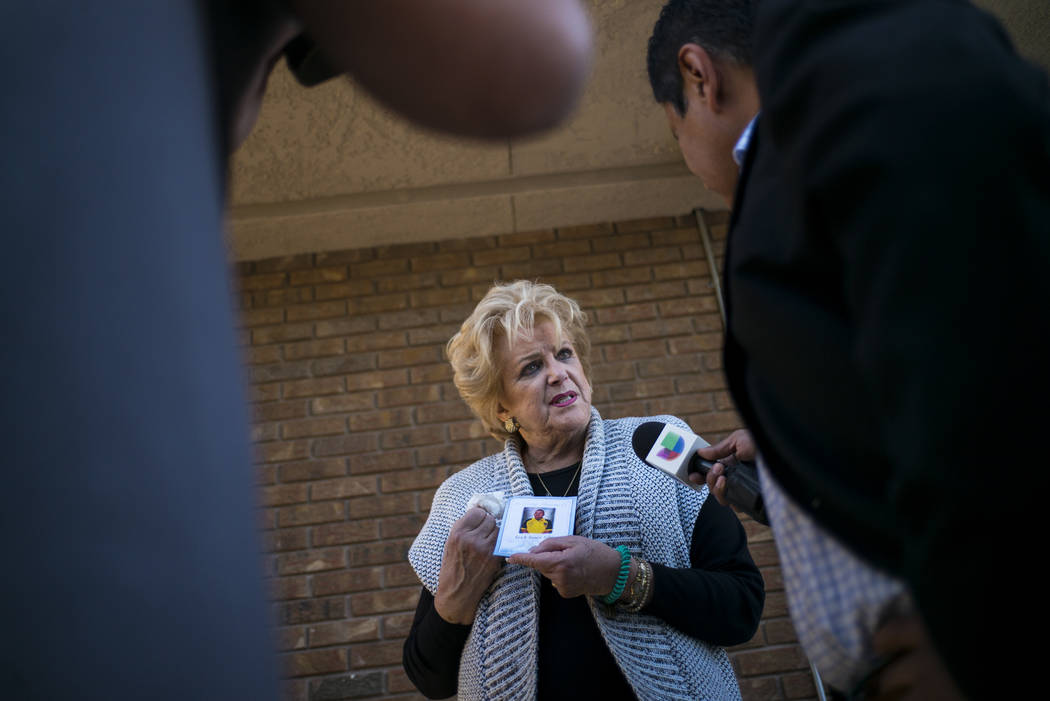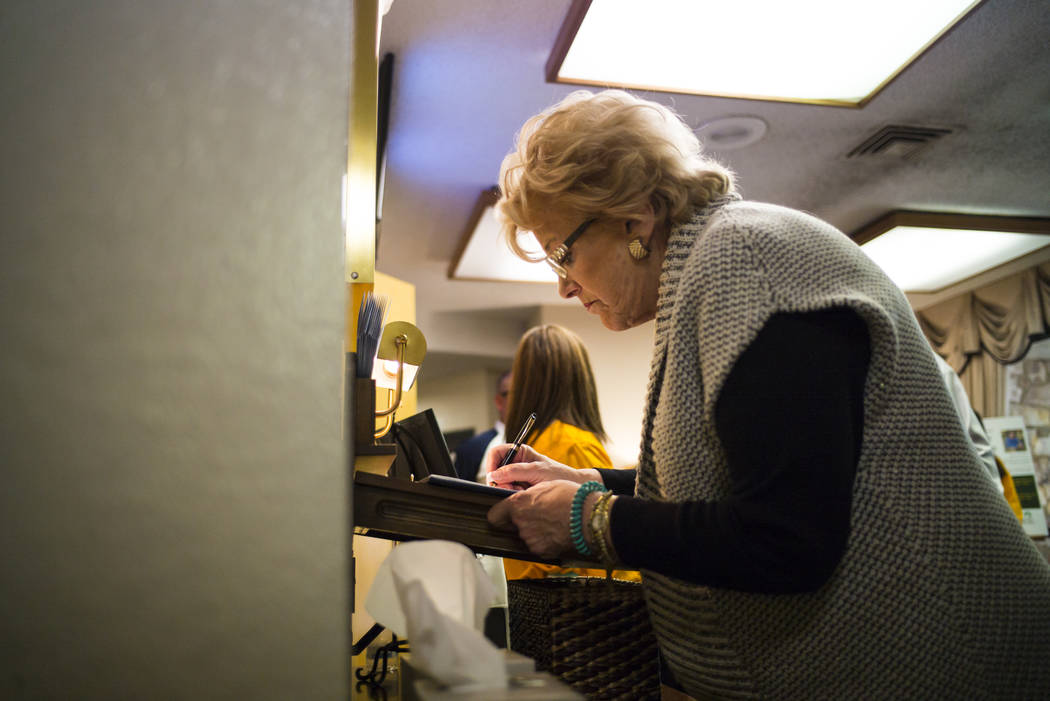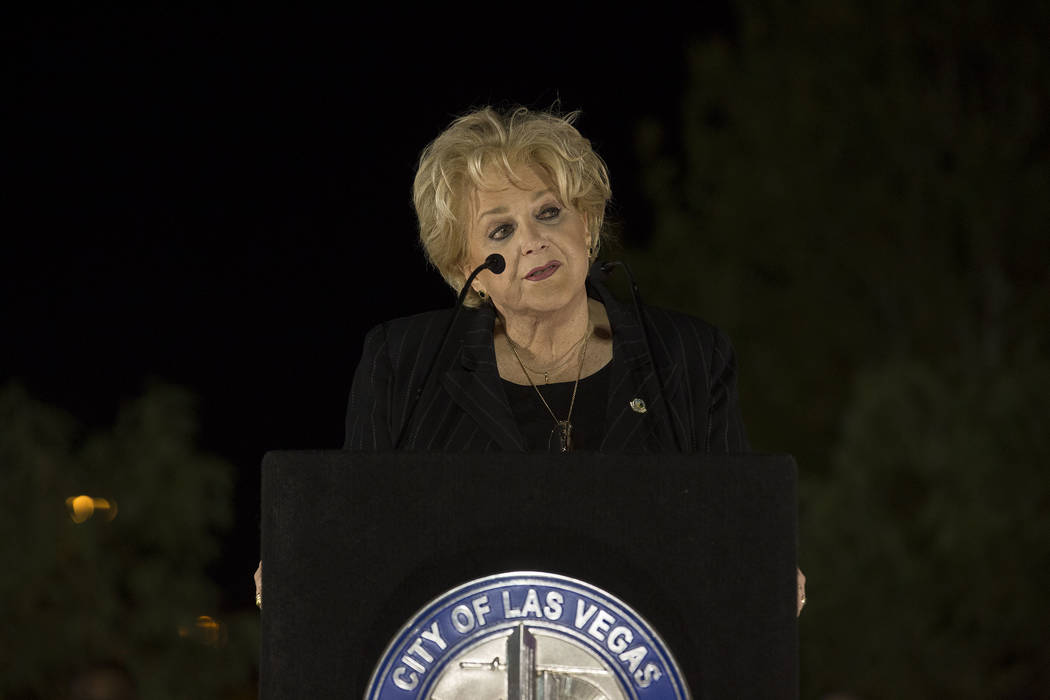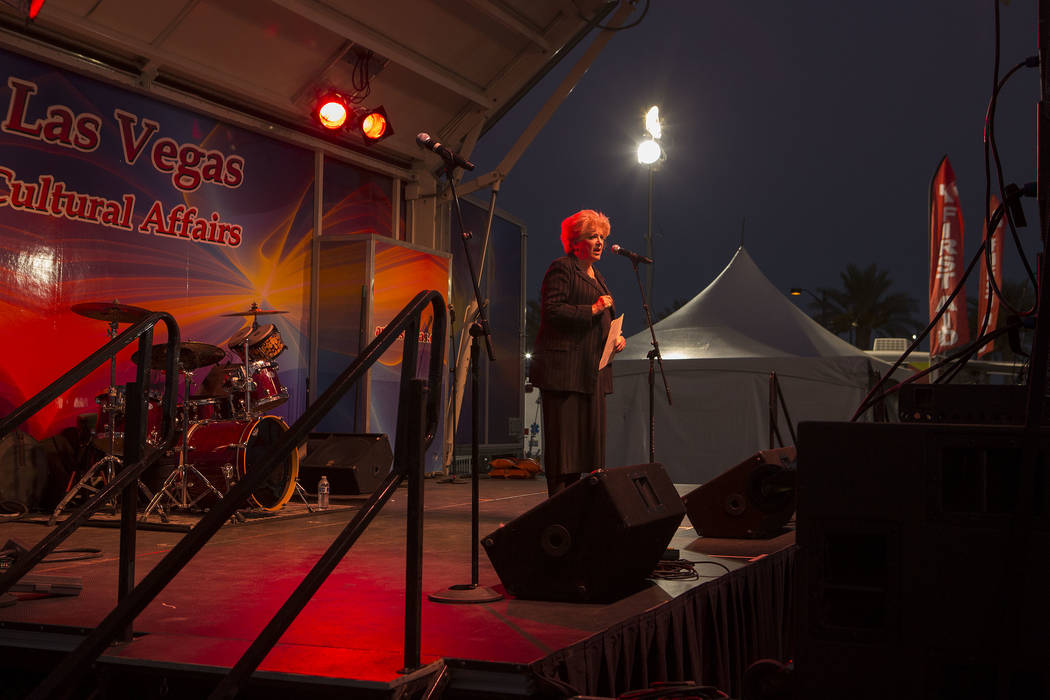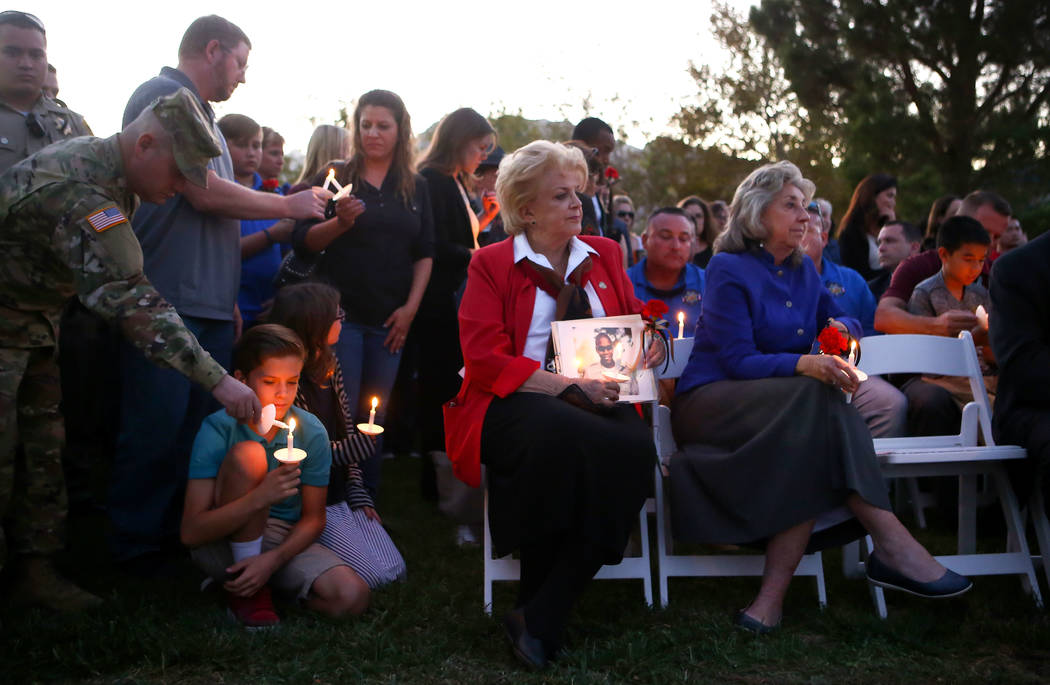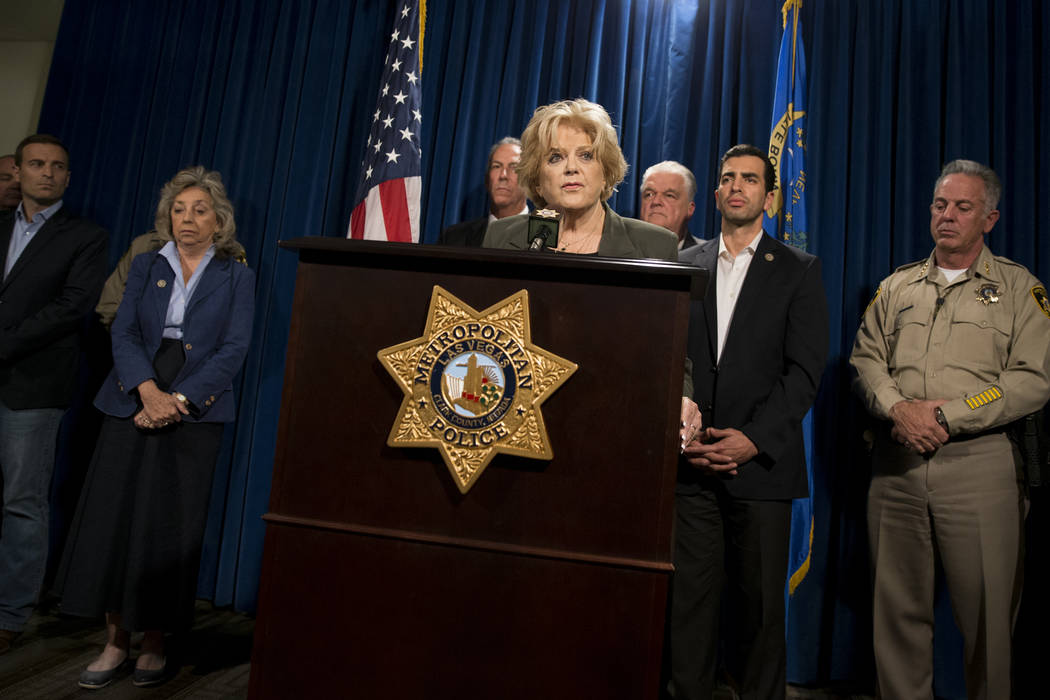Orlando helps Las Vegas recover after shooting
Mayor Buddy Dyer of Orlando, Florida, woke up early that Monday morning three weeks ago to a text message asking if he had Las Vegas Mayor Carolyn Goodman’s phone number.
He didn’t know why until he turned on the television to find out Las Vegas was rocked by a mass shooting the night before at the Route 91 Harvest country music festival.
The estimated number of dead surpassed the Pulse nightclub shooting in June 2016 in Orlando, when Dyer led the city’s recovery through what had been the deadliest shooting in recent U.S. history at that time.
Dyer dialed Goodman.
“I just said, ‘We’re thinking of you and praying for you. And anything we can do to assist you, we’re here to support you in any way we can,’ ” Dyer said. “After we got off the phone, I texted her back and said, ‘One of the things you probably haven’t started thinking about is the victims assistance center.’ ”
The next day, two of the Orlando city staffers who set up the assistance center in the wake of the Pulse shooting arrived in Las Vegas.
Craig Borkon and Kathy DeVault spent the next six days at the family assistance center in Las Vegas working with Clark County Emergency Management Director and Deputy Fire Chief John Steinbeck.
The center was operating out of the Las Vegas Convention Center by the afternoon of Oct. 2, less than 16 hours after the shooting. Borkon and DeVault brought west the lessons they learned last year, when they set up a one-stop shop for shooting victims and their families.
“It helps the families so they don’t have to spend hours on the phone, navigating very bureaucratic processes,” DeVault said. “After Pulse, there were things we found out on day four or five where we said if we’d known this on day one, it would have made our lives so much easier.”
After the Pulse shooting, about 50 agencies operated out of a center to help victims and families, the attorney general’s office, airlines, counseling services, funeral arrangements, even someone to help expedite car title changes.
“Things you don’t even think about,” Dyer said. “Someone is deceased, but their car is still parked in the neighborhood near Pulse.”
The family assistance center model isn’t necessarily a new concept, but it had been needed rarely at the scale it was in Orlando and Las Vegas, Borkon said.
“It’s always been there in manuals, in protocols, but it’s not something most communities train on,” Borkon said.
Leading through tragedy
Sister cities Las Vegas and Orlando have long been known around the world for captivating visitors, but the two are now bound by their tragic events.
Mayor Goodman had gone to bed early Oct. 1. Like Dyer in Orlando the year before, a phone call jolted her awake. It was David Riggleman, the city’s communications director. There was an active shooter at Mandalay Bay, but that’s all he knew.
Goodman got dressed and waited for Riggleman’s next phone call. She recalled Federal Emergency Management Agency training from early in her tenure as mayor, knowing she’d have a particular role to fill. She couldn’t wait for another phone call, so she went straight to Sheriff Joe Lombardo.
They decided Goodman would go to University Medical Center, the valley’s only Level I trauma center.
She spent most of the night at University Medical Center’s trauma center, talking to families and victims with less severe wounds. On Monday, Goodman was one in a line of elected officials flanking Lombardo during press briefings.
Then came the media interviews with outlets from all of the country and world, and greeting President Donald Trump, and later, Vice President Mike Pence on their visits. She attended memorials for victims and cut the ribbon on a community healing garden put together in downtown Las Vegas in four days.
“Those days were just a blur,” Goodman said. “My focus was absolutely to stay on those who were lost and their families. And then more specifically those who were still wounded and the bigger picture of Las Vegas and our resilience.”
In her speeches since, Goodman has called the gunman a “horrific, senseless animal,” and said she will “never mention that name.” She’s been “amazed” by tales of heroism by first responders and people who sprung into action to help fellow concertgoers.
Goodman’s message hasn’t been unlike Dyer’s first message to Orlando early on the morning of June 12, 2016, when he aimed to set the tone for a city that was waking up to tragedy, hours after a gunman opened fire inside Pulse, on the gay nightclub’s “Latin Night.”
“We won’t be defined by the hateful act of a demented killer. We will be defined by our response, and our response will be with love, compassion and unity,” Dyer said.
In the immediate aftermath of the Pulse shooting, Dyer’s hardest moment was coming out for the second news conference and saying 50 people had perished, more than doubling the previously estimated 20.
Because the LGBTQ community in Orlando was so hard-hit by the Pulse shooting, one of the themes of the city’s recovery was “about diversity, acceptance, equality,” Dyer said. “Some of our healing involved that aspect, as well.”
Learned lessons
When Dyer assembled a local committee that would weigh in on how the millions of dollars in victim assistance funds would be distributed, he made sure the LGBTQ and Latino communities were represented.
Officials in Las Vegas are just starting to navigate the process of deciding how victim funds should be distributed.
Victims’ compensation expert Ken Feinberg helped Orlando officials distribute more than $30 million from the OneOrlando Fund. He advised officials in Boston about distribution of money with the One FundBoston, which paid out more than $80 million to Boston Marathon bombing victims and also advised on the Sept. 11 Victim Compensation Fund. Now, Feinberg is helping Las Vegas officials in coordinating local victims’ funds.
Orlando already had a 501(c)3 set up to be able to raise funds for its Parramore Kidz Zone, a program aimed at curbing juvenile crime, teenage pregnancy and high school dropouts in the city’s highest-poverty neighborhood. Officials used that mechanism for the OneOrlando Fund, Dyer said.
Clark County Commission Chairman Steve Sisolak and Sheriff Joe Lombardo had created a GoFundMe account for victims, which had raised more than $11 million as of Friday. Clark County has also partnered with the National Compassion Fund for an ongoing fundraiser for victims. A committee that hasn’t been assembled yet will decide how those funds will be distributed.
“You’ve got to give a lot of thought to how you go about that,” Dyer said.
Officials in Las Vegas will keep assessing the Oct. 1 shooting, and Goodman will go back to officials in Orlando, in Boston and Sandy Hook, Connecticut, to talk more about what they learned in the aftermath of their own tragedies, she said.
Goodman is also recommending creation of a “crisis fund,” she said during an interview with the Review-Journal.
“Every city in the country should establish a crisis fund that has monies in it to help offset the immediacy of a disaster, whatever kind it is,” Goodman said.
Mayors reflect
For Dyer and other city workers in Orlando, the first anniversary of the Pulse shooting was in some ways harder than the immediate aftermath of the shooting.
“It hit me more then than when we were in the middle of it,” Dyer said.
That first week, Goodman kept telling herself “you’re trained for this, you have to do what your job is,” she said. “But you begin to feel it, the more tired you get. When you dwell on it.”
The one time she broke down was at the viewing for one victim. She put her arms around the victim’s young brother.
“He was standing there, not sobbing, but just a stream right down his face,” Goodman said. “His hero had died. So innocently, for nothing. You see family members and loved ones, and that’s difficult. I was very emotional, and I felt it, but I was contained. But not with that little boy.”
Contact Jamie Munks at jmunks@reviewjournal.com or 702-383-0340. Follow @JamieMunksRJ on Twitter.



